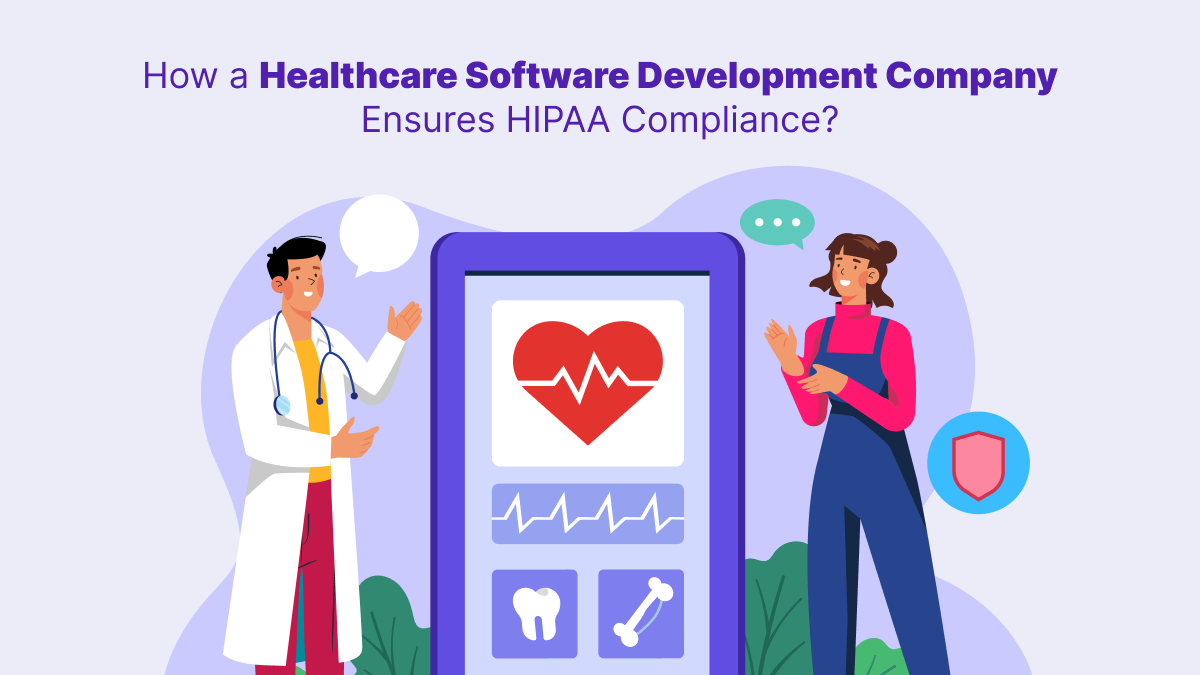In the healthcare industry, protecting patient information is not just a best practice—it’s a legal requirement. The Health Insurance Portability and Accountability Act, better known as HIPAA, sets the standard for protecting sensitive patient data in the United States. Healthcare organizations must comply with HIPAA to avoid serious legal penalties and to maintain the trust of their patients. For software companies developing healthcare solutions, ensuring HIPAA compliance is a critical part of the development process.
This blog will explain how a healthcare software development company ensures HIPAA compliance throughout the software creation lifecycle. We will cover the key principles of HIPAA, what it means for healthcare software, and how companies build secure, compliant software solutions that protect patient data and meet regulatory requirements.
Understanding HIPAA and Its Importance
What is HIPAA?
HIPAA is a federal law enacted in 1996 that establishes national standards for protecting sensitive patient health information. It applies to healthcare providers, insurance companies, and any business that handles protected health information (PHI). The goal of HIPAA is to safeguard patient privacy and secure electronic health records (EHRs) and other healthcare data.
Why HIPAA Compliance Matters for Healthcare Software
Healthcare software often deals with PHI, such as patient names, medical histories, test results, and billing information. Any breach of this data can lead to identity theft, fraud, and loss of patient trust. Therefore, healthcare software development companies must ensure that their applications comply with HIPAA rules to prevent data leaks, unauthorized access, and other security risks.
Key HIPAA Requirements for Software Development
Privacy Rule
This rule protects the privacy of individuals’ medical records and other personal health information. Software must allow only authorized users to access PHI and prevent unauthorized sharing or disclosure.
Security Rule
The Security Rule requires that electronic PHI (ePHI) be protected through administrative, physical, and technical safeguards. Software solutions must incorporate encryption, access controls, and audit logs to meet this standard.
Breach Notification Rule
In case of a data breach involving PHI, covered entities must notify affected individuals and government authorities within a specified time. Healthcare software should include mechanisms to detect and report breaches promptly.
Enforcement Rule
This rule sets penalties for HIPAA violations, which can be costly and damaging. Compliance reduces the risk of fines and protects an organization’s reputation.
How Healthcare Software Companies Approach HIPAA Compliance
Conducting Risk Assessments
A healthcare software development company starts by conducting a thorough risk assessment. This means identifying potential vulnerabilities in the software design and infrastructure that could expose PHI. The company evaluates where data might be at risk during storage, transmission, or processing.
Designing with Privacy and Security in Mind
From the earliest design phases, companies implement privacy by design principles. This means building software features that protect data at every step—such as limiting data access, encrypting data, and ensuring secure user authentication. Designing software with HIPAA compliance in mind prevents costly fixes later.
Implementing Access Controls
Healthcare software must restrict data access only to authorized users. Developers build role-based access controls (RBAC), which assign different levels of permissions depending on the user’s role. For example, a doctor may access full patient records, while administrative staff may only see billing information.
Using Encryption
Encryption is a fundamental technical safeguard under HIPAA. Data both “at rest” (stored on servers) and “in transit” (being sent between systems) should be encrypted. Healthcare software development companies use strong encryption standards to protect data against interception and unauthorized access.
Maintaining Audit Logs
To track who accessed PHI and when, software must keep detailed audit logs. These logs are essential for monitoring suspicious activity and investigating security incidents. The logs must be tamper-proof to ensure their reliability.
Secure Data Storage and Backup
Healthcare software must store data securely, often in HIPAA-compliant cloud environments or secure data centers. Regular data backups and disaster recovery plans ensure that PHI is not lost and can be restored quickly after any failure.
Regular Security Testing
Healthcare software companies perform continuous security testing, including penetration testing and vulnerability assessments. These tests identify weaknesses before hackers can exploit them. Addressing vulnerabilities is an ongoing part of maintaining HIPAA compliance.
Training and Awareness
Educating the Development Team
HIPAA compliance is not only about technology; it also depends on people. Software companies ensure their development teams understand HIPAA requirements and best security practices. Training sessions and policies help developers stay aware of compliance issues.
Secure Development Lifecycle
Many companies follow a Secure Software Development Lifecycle (SDLC) approach, integrating security checks and compliance reviews into every stage of development—from planning and coding to testing and deployment.
Collaboration with Clients and Third Parties
Understanding Client Needs
Healthcare software companies work closely with their clients—hospitals, clinics, or insurance companies—to understand their specific compliance needs and workflows. Customized solutions can then be developed to fit those requirements.
Vendor Management
When software companies rely on third-party services (such as cloud providers or analytics tools), they ensure those vendors also comply with HIPAA. Business Associate Agreements (BAAs) are signed to hold third parties accountable for protecting PHI.
Ongoing Compliance and Updates
Monitoring Compliance After Deployment
HIPAA compliance is an ongoing effort. Healthcare software companies provide tools for continuous monitoring and alerting to detect security breaches or suspicious activities.
Updating Software for New Regulations
Regulations evolve over time. Software companies keep their products up-to-date with the latest legal requirements and security standards to maintain ongoing compliance.
Real-World Examples of HIPAA Compliance in Software
Electronic Health Record (EHR) Systems
EHR software is among the most heavily regulated healthcare applications. A HIPAA-compliant EHR system must encrypt patient data, limit access through role-based permissions, and keep audit trails of all activity. Many healthcare software companies specialize in building such systems with strong compliance features.
Telemedicine Platforms
Telehealth apps must ensure secure video communication, protect patient conversations, and verify user identities. Compliance means using encrypted communication channels and preventing unauthorized recording or sharing.
Patient Portals
Patient portals give patients access to their health information. Software companies ensure that these portals require strong user authentication and protect the data shown on the portal against unauthorized access.
Conclusion
Ensuring HIPAA compliance is a complex but essential part of healthcare software development. From the initial design stages to ongoing monitoring and updates, healthcare software development companies take numerous technical and organizational steps to protect patient information. They combine strong encryption, access controls, audit trails, and secure hosting with regular risk assessments and staff training. This comprehensive approach helps healthcare providers meet legal obligations, safeguard sensitive data, and build trust with their patients.
Partnering with a reliable software provider who understands HIPAA rules and healthcare industry needs is vital for any healthcare organization. By leveraging on demand app development services, healthcare providers can access tailored software solutions that not only enhance patient care but also keep patient information secure and compliant with the law. This partnership ensures a future where healthcare technology continues to evolve safely and responsibly.
FAQs
What does HIPAA compliance mean for healthcare software developers?
It means building software that protects patient health information through strict security measures, privacy controls, and regulatory adherence.
How do healthcare software companies ensure data encryption?
They use industry-standard encryption methods for data stored on servers and data transmitted between systems to prevent unauthorized access.
Why are audit logs important in HIPAA compliance?
Audit logs help track access to sensitive data, allowing organizations to detect suspicious behavior and investigate any potential breaches.
Can third-party services be HIPAA compliant?
Yes, but healthcare software companies must have Business Associate Agreements with these vendors to ensure they meet HIPAA requirements.
How often should healthcare software be updated for compliance?
Software should be regularly updated to address new security vulnerabilities and changes in regulations, often through scheduled maintenance and patching.

